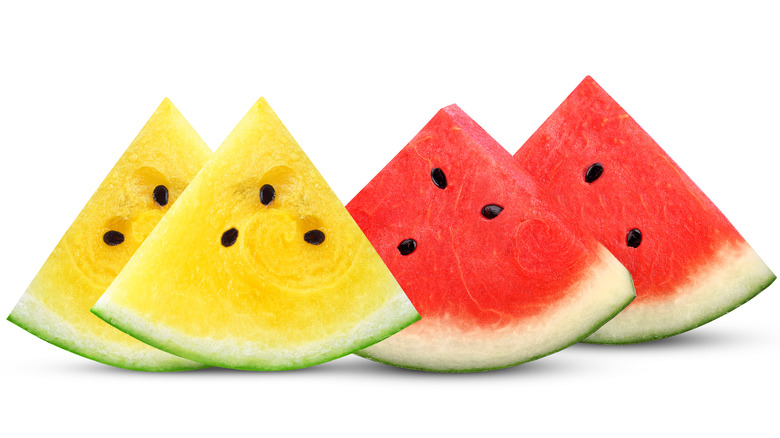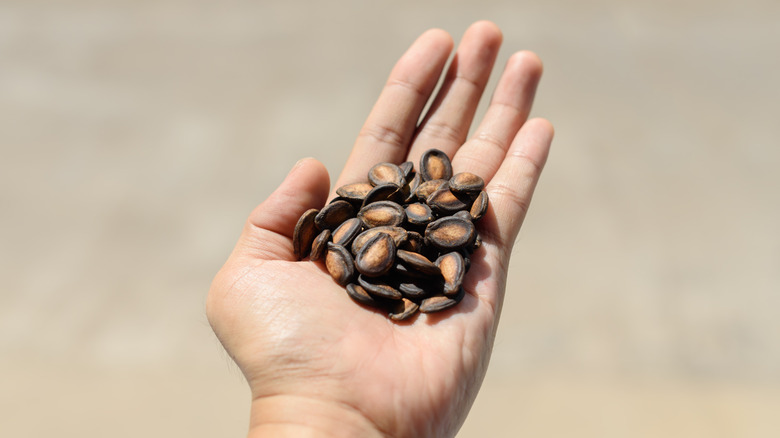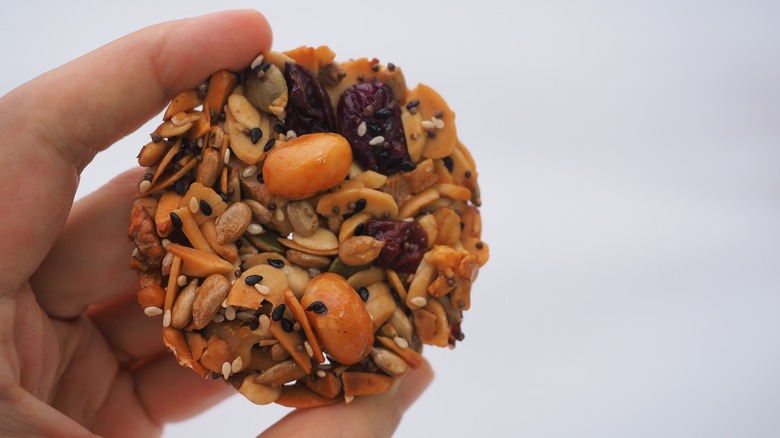Roast Your Watermelon Seeds For An Enviably Crunchy Snack
It seems like everyone has childhood memories of sitting at the beach or just in the front yard with their friends, eating juicy slices of watermelon to hydrate and cool off from the summer sun. After we took enormous bites, we'd spit the seeds out, making a contest of who could spit the furthest. In all reality, we could have eaten those seeds with no fear because they're entirely edible. They're just not very easy to chew and they don't really taste like much, which is why most of us resorted to shooting them out of our mouths.
Contrary to popular (and mythical) belief, a watermelon will not grow in your stomach if you eat the seeds. But they do make for a very nutritious snack. After all, we eat sunflower and pumpkin seeds, so why not those from a favorite summer fruit? The problem is, they are equal parts chewy and hard. In order to get them to a state where they're actually enjoyable to eat, you need to roast them first.
Roasting watermelon seeds 101
To roast watermelon seeds, first you'll need to remove them from the fruit. Use the black seeds, which are fully mature seeds, not the white ones. Rinse them in water to clean off any fruit and juice and let them dry completely. If they are wet when you put them in the oven, you won't get an extra crunchy result, which is what you're going for. Once they are dried, you can toss the seeds in a little oil and salt and roast them in an oven heated to 325 degrees Fahrenheit for about 15 minutes. Once cooled, they're ready to eat. While they're normally bland and pretty tasteless, once they are roasted they become rich and nutty.
As far as flavoring them, they are about as versatile as popcorn, which is to say, you can douse roasted watermelon seeds with a slew of ingredients. Try tossing them in your own spice mixes, like cinnamon and sugar; chili powder, salt, and lime; or brown sugar, salt, and cayenne pepper. You'll have a tasty, crunchy snack that you can eat on its own or use in place of other nuts and seeds in dishes you enjoy.
Nutritious and delicious
Roasted watermelon seeds can be showered on salads, sprinkled on yogurt and fruit parfaits in place of granola, used as a garnish for soups and dips, added to baked goods, eaten with oatmeal, and added to trail mix. You can store them in a resealable plastic bag or airtight container in a cool, dry place where they'll stay crunchy and ready to use anytime. Snacking on a handful at a time is also a nutritious way to satisfy your afternoon hunger.
According to Healthline, a handful of watermelon seeds has about 23 calories, but is high in minerals. In that same handful, you'll get about 5% of your daily magnesium needs which supports immune, heart, and bone health. You'll also get a boost of iron and zinc, plus some good fat in the form of monounsaturated and polyunsaturated fats, which protect against heart attack and fight "bad" cholesterol in your blood. The next time you eat watermelon, instead of being annoyed by all the seeds you're trying to eat around (or spit further than your sibling can), save them and look forward to a new, delicious, homemade snack.



